|
|
|
Sort Order |
|
|
|
Items / Page
|
|
|
|
|
|
|
| Srl | Item |
| 1 |
ID:
171635


|
|
|
|
|
| Summary/Abstract |
Currently, among the approximately 20,000 ethnic Koreans living in Argentina, an estimated 80% are engaged in the garment industry. Within the theoretical frameworks of immigrant entrepreneurship, this research examines why and how Korean Argentines have been continuously concentrated in the clothing industry from the beginning of Korean immigration in the 1960s to the present. Based on ethnographic research conducted in Argentina and on archival and documentary research, this study illustrates how Korean immigrant community in Argentina has settled and achieved upward mobility in the face of complex and fluctuating social and economic circumstances, combining opportunities with strategies and resources to create comparative advantages and benefits. By combining historical contextualisation with theories on immigrant entrepreneurs that had previously only been tested on short-term study periods, findings further suggest that scholars should pay closer attention to historical shifts and accounts in analysing longer-term periods of ethnic business.
|
|
|
|
|
|
|
|
|
|
|
|
|
|
|
|
| 2 |
ID:
099101
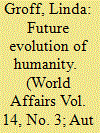

|
|
|
| 3 |
ID:
127069
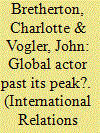

|
|
|
|
|
| Publication |
2013.
|
| Summary/Abstract |
Examining a range of policy areas in which the European Union (EU) acts externally - notably trade, development, climate change and foreign and security policy - this article considers the notion that the years since the mid-2000s have witnessed a decline in EU actorness/effectiveness. In evaluating EU performance, the article employs the interrelated concepts of presence, denoting EU status and influence; opportunity, denoting the external context of EU action; and capability, referring to EU policy processes and instruments, with particular reference to the impact of the 2009 Lisbon Treaty. It is contended that achievement of the increased capability envisaged by the Lisbon Treaty, together with resolution of the Eurozone crisis, with its deleterious effect upon the Union's presence, would not fully compensate for the loss of opportunity provided by the changing international structure.
|
|
|
|
|
|
|
|
|
|
|
|
|
|
|
|
| 4 |
ID:
101161


|
|
|
|
|
| Publication |
2010.
|
| Summary/Abstract |
While there is a large and growing body of research describing and analyzing changes in the Chinese income distribution, researchers have paid considerable less attention to inequality of opportunity. The aim of this paper is to contribute to filling this gap in the literature. The two main questions addressed empirically for the first time in a Chinese context are: to what extent are individuals' incomes and individual income differences due to factors beyond the individual's control (in Roemer's terminology "circumstances") and to what extent are they due to outcomes of the individual's own choices ("effort"). What is the relationship between income inequality and inequality of opportunity?
For this purpose we use data from the China Health and Nutrition Survey collected from nine provinces during the period 1989 to 2006. The CHNS has detailed information about incomes and other factors enabling us to construct a host of circumstance and effort variables for the offspring.
We find that China has a substantial degree of inequality of opportunity. Parental income and parents' type of employer explain about two thirds of the total inequality of opportunity. Notably, parental education plays only a minor role implying that parental connections remain important. The results show that the increase in income inequality during the period under study largely mirrors the increase in inequality of opportunity. Thus, increased income inequality does not reflect changes in effort variables, or expressed differently, increased income inequality has not been accompanied by a decrease in inequality of opportunity.
|
|
|
|
|
|
|
|
|
|
|
|
|
|
|
|
| 5 |
ID:
157063


|
|
|
|
|
| Summary/Abstract |
This article examines the recent trends of opportunities available for women in Sri Lanka in accessing the labour force by using the Social Opportunity Function presented by Ali and Son (2007). Opportunity curves were constructed for women and men separately to assess the equity-impacts of access opportunities to be in the labour force across different expenditure groups. Opportunity index (OI) (average opportunities available to the population) and the Equity Index of Opportunity (EIO) (how opportunities are shared or distributed among the population) calculated for both sexes to quantify the precise magnitude of the change. Household Income and Expenditure Survey (HIES) data produced by the Department of Census and Statistics of Sri Lanka was the main data source. Construction of Opportunity Curves revealed that opportunities for women in accessing labour force have declined over time across all expenditure groups. But it is more remarkable for women in the lower expenditure deciles. In the case of men, mixed results could be observed for different expenditure deciles. Regardless of the sex, average opportunities to access the labour force, OI and EIO have deteriorated over the time period considered.
|
|
|
|
|
|
|
|
|
|
|
|
|
|
|
|
| 6 |
ID:
077331
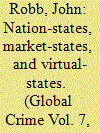

|
|
|
|
|
| Publication |
2006.
|
| Summary/Abstract |
The advent of a global economic and physical superinfrastructure is in the process of transforming terrorism, guerrilla warfare, and the nation-state. A useful model for understanding this process of transformation is Philip Bobbitt's work, "The Shield of Achilles." Bobbitt's work demonstrates that the nation-state is in a difficult and dangerous process of transition to a new form of governance, called the market-state, that is built to withstand and prosper despite the pressures of globalization. This process is complicated by the emergence of a vicious asymmetric competitor, in the form of a virtual state that leverages the huge flows of the global criminal economy, combined with the weakness of the nation-state during its phase transition to the market-state. This essay details the structure of this conflict and provides a scenario for its potential outcome
|
|
|
|
|
|
|
|
|
|
|
|
|
|
|
|
| 7 |
ID:
188712


|
|
|
|
|
| Summary/Abstract |
Grievance and opportunity theories dominate research on the causes of civil war. However, theoretical and empirical problems limit their ability to explain variation in conflict onset. We argue that these problems partly stem from treating them as largely independent explanations. We integrate grievance and opportunity into a unified theory and argue that they are complements that jointly predict conflict. We apply insights from the interstate war literature to develop and test a theory of conflict onset that argues that the probability of civil war increases as the disparity between relative power and the status quo distribution of benefits increases.
|
|
|
|
|
|
|
|
|
|
|
|
|
|
|
|
| 8 |
ID:
088318


|
|
|
|
|
| Publication |
2009.
|
| Summary/Abstract |
Nepal's relationship with its northern neighbour, Tibet, was cemented when the Nepali princess Bhrikuti Devi married the king of Tibet, Songtsan Gampo, in the seventh century AD and earned the divine title White Tara. Thereafter, hundreds of Nepali artisans visited Tibet to build monasteries; and trade in bronze, gold and silver idols of Tara and other deities became one of the cornerstones of commerce between the two countries. For Nepal, Tibet was a more immediate entity than China, for thinking of distant Shanghai as a city with which to do business was farfetched.
During the mid-16th century, a treaty was signed between Nepal and Tibet that made Kathmandu the sole entrepot for the latter. In a fairly short timeframe, this allowed the ethnic Newar merchants of the Kathmandu Valley to build a roaring business with Tibet, trading with goods to and from India. However, defeat to a Chinese expedition force in 1792 changed Nepal's fortunes till trade was restored in 1856, when Nepal invaded Tibet and forced the trade routes to re-open. The Newar merchants again began to set up businesses in Lhasa, where they could trade goods from India and other parts of the world for gold and silver.
|
|
|
|
|
|
|
|
|
|
|
|
|
|
|
|
| 9 |
ID:
139994


|
|
|
|
|
| Summary/Abstract |
This article describes the development of foreign fighters’ preparatory modes of operation between 2000 and 2013, based on an analysis of 17 closed police investigations and 21 semi-structured interviews with police investigators, public prosecutors, and lawyers. Through the use of grounded theory methods and a crime script analysis, we find that the phenomenon is not as new as is often portrayed. It changes over time as changing opportunity structures have an impact on the activities foreign fighters undertake during the preparation phase. We demonstrate how geopolitical changes, social opportunity structures, and technological developments affect the modus operandi over time. One of the implications of our findings is that the dynamic nature of the foreign fighting phenomenon requires flexible and tailored prevention measures.
|
|
|
|
|
|
|
|
|
|
|
|
|
|
|
|
| 10 |
ID:
174005
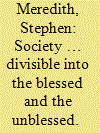

|
|
|
|
|
| Summary/Abstract |
‘Meritocracy’ continues to unfold as both core conceptual framework and political ideal of the language of social mobility. In recent decades, politicians of various hues have declared it a sine qua non of the so‐called ‘classless society’. The longer trajectory of postwar discourses of equality reveal a more chequered conceptual past. Its origins in the forums of revisionist social democracy of the 1950s, and subsequently popularised in the writings of social democratic polymath, Michael Young, are much more circumspect. The article considers pivotal contributions and developments of this conceptual history and trajectory. It considers the origins and emergence of meritocracy as a dimension of discourses of equality in the 1950s, and the formative contribution of Michael Young, reaction and responses on the left to his 1958 seminal work, The Rise of the Meritocracy, and the subsequent ‘meritocratic turn’. In spite of its satirical origins and warnings of dire social consequences, meritocracy presently enjoys a confirmatory position as a concept of opportunity and social mobility, as an embedded ideal of social organisation and means of allocating differential rewards.
|
|
|
|
|
|
|
|
|
|
|
|
|
|
|
|
| 11 |
ID:
142022
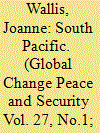

|
|
|
|
|
| Summary/Abstract |
The term ‘arc of instability’ was first used in 1999 to describe the security challenges facing the South Pacific. It subsequently came to dominate Australian political discourse, although its veracity was critiqued. This article considers how Australia's political discourse about the region has evolved since 1999 and what impact this has had on Australia's relationships in the region. It begins by outlining why the arc of instability characterization emerged and how it contributed to the securitization of the South Pacific, which justified Australia's policy of new interventionism in the region. It concludes by considering whether it might be time to recharacterize the region as an ‘arc of opportunity’. This recharacterization may shift the political discourse to focus on the South Pacific's potential and opportunities, desecuritize Australia's relationship with the region and diffuse concerns about continued Australian intervention by articulating a more cooperative approach.
|
|
|
|
|
|
|
|
|
|
|
|
|
|
|
|
|
|
|
|
|